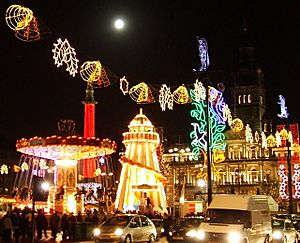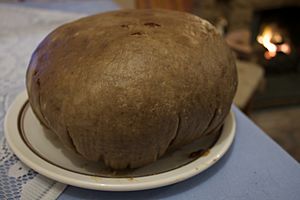Christmas in Scotland facts for kids
Before the year 1560, Christmas in Scotland was known as Yule. People celebrated it much like the rest of Europe. There were games and big feasts. However, after the Scottish Reformation in 1560, things changed a lot. The Church of Scotland, also called the Kirk, became very powerful. It decided that many traditional Christian holidays, including Christmas, should no longer be celebrated.
The Scottish Parliament even passed a law in 1640. This law officially stopped the "Yule vacation" and all ways of celebrating it. This meant Christmas was not a holiday anymore.
Contents
Christmas in Scotland: A Changing Tradition
Why Christmas Celebrations Stopped
After the Reformation, the Church of Scotland, which was a Presbyterian church, had strong reasons for stopping Christmas celebrations. They believed that many traditions were too much like older, non-Christian customs or were too "superstitious." They wanted to keep religious practices very simple and focused on the Bible.
Because of this, two important laws were passed by the Scottish Parliament:
- The first law, called Act discharging the Yule vacance, was made on June 2, 1640.
- The second law, with the same name, was passed on April 15, 1690.
These laws officially ended the Christmas holiday, known as the Yule Vacance.
The 1640 law clearly stated that the church in Scotland was now "purged of all superstitious observation of days." It said that the Yule vacation and all ways of celebrating it were "extinct, void and of no force." This meant Christmas was completely cancelled as a holiday.
For a short time in 1686, one of these laws was partly cancelled. This happened when a different type of church, called Episcopalianism, was briefly more powerful. But the ban on Christmas returned. Later, in 1712, the British Parliament in Westminster partly cancelled the second law.
Even with these changes, Christmas was still not a big celebration in Scotland for a long time. It only became a public holiday in Scotland in 1871. Another holiday, Boxing Day, became a public holiday much later, in 1974.
The "Daft Days" Festivities
Even though Christmas Day itself was not celebrated, Scots had their own special winter traditions. The period from Christmas to Handsel Monday was known as the "Daft Days." This time included Hogmanay (New Year's Eve) and Ne'erday (New Year's Day). These were the main times for parties, gift-giving, and feasting. Hogmanay was by far the biggest celebration in Scotland for many years.
Christmas Returns: Modern Celebrations
For a long time, Christmas in Scotland was very quiet. This was because the Church of Scotland discouraged big celebrations. However, since the 1980s, things have changed a lot. The influence of the church has lessened, and Scotland has become more connected with other parts of the United Kingdom and the world.
Now, Christmas and its related festivities are almost as popular as Hogmanay and New Year's Day. Cities like Edinburgh and Glasgow often have traditional German Christmas markets. These markets open from late November and stay open until Christmas Eve, bringing a festive spirit to the cities.
See also
- Auld Lang Syne
- Five Articles of Perth
- Little Christmas
- Tàladh Chrìosda
- Up Helly Aa
 | DeHart Hubbard |
 | Wilma Rudolph |
 | Jesse Owens |
 | Jackie Joyner-Kersee |
 | Major Taylor |



